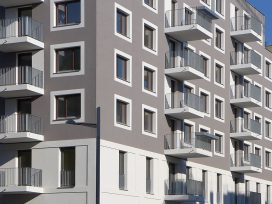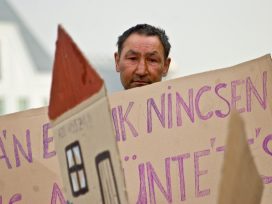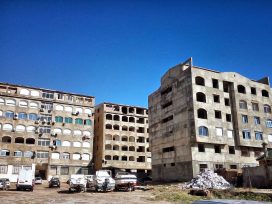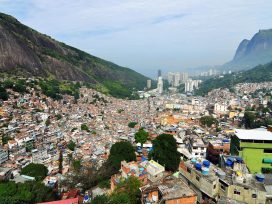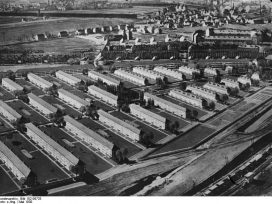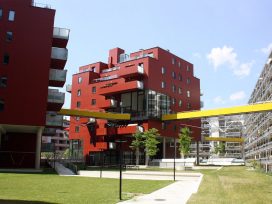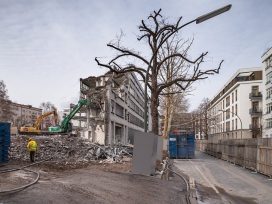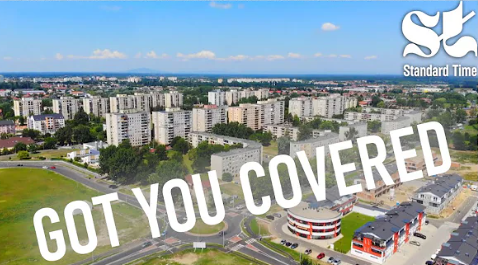
[ad_1]
Across European cities, real estate markets are riddled with speculation, and this makes affordable living harder and harder to attain. Between 2021 and 2022, residential property prices increased by more than 9 percent on an EU average, with some countries especially experiencing sharp increases. In Estonia, Czechia, Hungary and Lithuania, for instance, house prices rose by over 20% during this period.
In 2021, 17% of the EU population lived in overcrowded households, nearly 7% were unable to keep their homes adequately warm, and 8.3% experienced explicit housing poverty – that means they spend 40% or more of their household income on housing.
It has been established that home ownership has become a distant dream for millennials and their juniors, unless they inherited wealth. This remains the case even though real house prices fell by 5% over the past few years. Market prices are still way out of touch with real salaries.
Even worse: renting has also grown unaffordable. Over the past eight years, Ireland, Hungary, and Poland witnessed a 75% rise in rent. In Berlin prices shot up by around 50%, despite some mild rent control measures. The gentrification of European capitals actively fuels this tendency, affecting mainly ethnicized neighbourhoods and minorities.
With homelessness increasing, a great many political actors abuse this situation for fear-mongering against those who are forced to sleep in the streets. The public hatred against the visibly poor has roots reaching back at least five centuries in European history. Real estate ownership is growing as a political watershed. A notable example is offered by English electoral politics, where the most likely determining factor of a voter’s party preference is whether or not they own a home, or have passive income from real estate. But anti-poor populism is not limited by the English Channel; the German far-right and the Hungarian government brew their own blends, and residential animosity is widespread in conservative politics across the continents.
A rosier legacy
European countries have been building social and supported housing since the 19th and 20th. As the Industrial Revolution brought great masses to urban centres, this pressure ignited public housing, first as tenement blocks and boarding houses. Many of the historic city centres we admire today, as well as social housing projects, were built under this pressure. Housing investment exploded in the aftermath of the world wars, when nations had to find rapid solutions for large numbers of people displaced by warfare. Yet, as firm as many of these projects still stand, social housing is not as popular as it once was, and many nation states continue to subsidise middle and upper class wealth building instead of finding solutions for the poor. You can read about this, and much more, in Eurozine’s focal point: Room temperature.
Elke Rauth is the editor of the urbanist magazine Dérive, and the co-curator of the urbanize! Festival for urban exploration. She is part of the habiTAT rental house syndicate of the Bikes and Rails House Project in Vienna; a network of self-organised housing projects that aim at buying houses and securing them as self-managed spaces.
Lenke Pálfi and Adél Csűrök are the colleagues of the From Streets to Homes Association, pioneering the Housing First method in Hungary. They help rough sleepers move into affordable rental housing, as well as advocate for affordable rental housing as a solution to homelessness.
We meet with them at Bikes and Rails Housing Project in Vienna, Austria.
Creative team
Réka Kinga Papp, editor-in-chief
Merve Akyel, art director
Szilvia Pintér, producer
Zsófia Gabriella Papp, executive producer
Margarita Lechner, writer-editor
Salma Shaka, writer-editor
Priyanka Hutschenreiter, project assistant
Management
Hermann Riessner managing director
Judit Csikós project manager
Csilla Nagyné Kardos, office administration
OKTO Crew
Senad Hergić producer
Leah Hochedlinger video recording
Marlena Stolze video recording
Clemens Schmiedbauer video recording
Richard Brusek sound recording
Video Crew Budapest
Nóra Ruszkai, sound engineering
Gergely Áron Pápai, photography
László Halász, photography
Postproduction
Nóra Ruszkai, lead video editor
Kateryna Kuzmenko dialogue editor
Art
Victor Maria Lima, animation
Cornelia Frischauf, theme music
Captions and subtitles
Julia Sobota closed captions, Polish and French subtitles; language versions management
Farah Ayyash Arabic subtitles
Mia Belén Soriano Spanish subtitles
Marta Ferdebar Croatian subtitles
Lídia Nádori German subtitles
Katalin Szlukovényi Hungarian subtitles
Daniela Univazo German subtitles
Olena Yermakova Ukrainian subtitles
Aida Yermekbayeva Russian subtitles
Mars Zaslavsky Italian subtitles
Sources
Gimme shelter: Cost-of-living crisis squeezes Europe’s housing by Giovanni Coi, Politico
The risk of a housing bubble is shrinking across the world… except in one European city by James Thomas, Euronews
Berlin, Barcelona, and the Struggle Against Gentrification by Tere Garcia, Smart Cities Dive
Related reads
Room Temperature, Eurozine Editorial
Disclosure
This talk show is a Display Europe production: a ground-breaking media platform anchored in public values.
This programme is co-funded by the Creative Europe Programme of the European Union and the European Cultural Foundation.
Importantly, the views and opinions expressed here are those of the authors and speakers only and do not necessarily reflect those of the European Union or the European Education and Culture Executive Agency (EACEA). Neither the European Union nor the EACEA can be held responsible for them.

Source link

